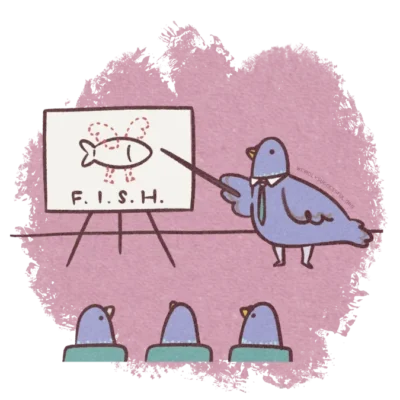allistic
The term allistic refers to people who are not autistic. Neurodivergent and neurotypical people can both be allistic if they are not autistic.

Neurodivergent Adaptation Educator
The term allistic refers to people who are not autistic. Neurodivergent and neurotypical people can both be allistic if they are not autistic.

'Neurotypical' describes people whose brain functioning follows common patterns, making it easier for them to align with common expectations in areas like processing sensory information, understanding social cues, following conversations and managing everyday tasks.
Most of our current societies are calibrated to neurotypical functioning with narrow margins of error, which can inadvertently …
The word neurodiversity is used to describe a diverse group of individuals with different neurotypes. It includes all humans, though colloquially it is often used for a group of neurodivergent people.
Ruminations are thought loops that you seemingly can’t get out of. Examples: thinking about what you should’ve said 5 years ago, feeling anxious if they misunderstood you, or worrying about whether you should’ve behaved differently, did they judge you, whether you were in the wrong, etc. Can be present in both OCD or ADHD.

A feeling of immense distress, a sensory overwhelm / autistic overwhelm is a strong reaction caused by the compounded effects of stress, exhaustion, lack of safety, a sense of danger, unmet needs, too much information, noise, sights or sounds, smells or touch.
Body doubling means doing a task or errand with someone else or in the presence of someone else so it's easier to start or follow through.
Their supportive presence helps create a safe, anchoring environment that makes it easier to start and follow through with tasks -- without pressure or judgment.
It is one of the strategies for managing focus and creating a flow for work, even if you feel …

Stimming (also known as self-stimulating) is a common sensory-seeking neurodivergent behaviour. It means stimulating yourself in a repetitive manner to self-soothe, regulate, or express excitement. Stimming is common both in ADHD and autism.
Stimming movements, however, are common in all human beings. Everybody stims, whether it's chewing the end of a pencil while you think, swaying back and …
Co-occurrence means that certain neurodivergent traits and conditions naturally tend to appear together. When you're neurodivergent in one way, you're more likely to experience other forms of neurodivergence too - research shows this happens in up to 70% of cases. These patterns extend beyond just neurodevelopmental differences to include physical health and mental health experiences. …
Neurodivergent conditions include ADHD, Autism, OCD, Sensory Processing Disorder and specific learning difficulties, like dyslexia, dyscalculia and dysgraphia.
Ableism is discrimination and social prejudice against people with physical or mental disabilities. In an ableist society, it’s assumed that the “normal” way to live is as a non-disabled person and that every disabled person needs to or wants to “get rid of” their condition.
Titration is when together with your medical professional you trial different types of medications and the doctor then adjusts the dose based on your experience.

Self-compassion literally means what it says on the tin: you have compassion for yourself. You can feel empathy towards yourself, you can be kind, even loving towards yourself. But it is often overlooked in favour of self-care. Learn why it's so crucial for every neurodivergent person to learn self-compassion.
